 McArthur, A.G., Waglechner, N., Nizam, F., Pereira, S.K., Jia, B., Sardar, D., Westman, E.L., Pawlowski, A.C., Johnson, T., Lo, R., Courtot, M., Brinkman, F.S., Williams, L.E., Frye, J.G., & Wright, G.D. 2015. The Comprehensive Antibiotic Resistance Database. Presentation at the 4th ASM Conference on Antimicrobial Resistance in Zoonotic Bacteria and Foodborne Pathogens, Washington, District of Columbia.
McArthur, A.G., Waglechner, N., Nizam, F., Pereira, S.K., Jia, B., Sardar, D., Westman, E.L., Pawlowski, A.C., Johnson, T., Lo, R., Courtot, M., Brinkman, F.S., Williams, L.E., Frye, J.G., & Wright, G.D. 2015. The Comprehensive Antibiotic Resistance Database. Presentation at the 4th ASM Conference on Antimicrobial Resistance in Zoonotic Bacteria and Foodborne Pathogens, Washington, District of Columbia.
Antimicrobial resistance (AMR) is among the most pressing public health crises of the 21st Century. Despite the importance of resistance to health, this field has been slow to take advantage of genome scale tools. Rather, phenotype based criteria dominate the epidemiology of antibiotic action and effectiveness. As a result, there is a poor understanding of which antibiotic resistance genes are in circulation, which ones are a threat, and how clinicians and public health workers can manage the crisis of resistance. However, DNA sequencing is rapidly decreasing in cost and as such we are on the cusp of an age of high-throughput molecular epidemiology. What are needed are tools for rapid, accurate analysis of DNA sequence data for the genetic underpinnings of antibiotic resistance. In an effort to address this problem, we have created the Comprehensive Antibiotic Resistance Database (arpcard.mcmaster.ca). This database is a rigorously curated collection of known antibiotics, targets, and resistance determinants. It integrates disparate molecular and sequence data, provides a unique organizing principle in the form of the Antibiotic Resistance Ontology (ARO), and can quickly identify putative antibiotic resistance genes in raw genome sequences using the novel Resistance Gene Identifier (RGI). Here we review the current state of the CARD, particularly recent advances in the curation of resistance determinants and the structure of the ARO. We will also present our plans for development of semi- and fully-automated text mining algorithms for curation of broader AMR data, construction of Probabilistic Graphic Models for improved AMR phenotype prediction, and development of portable command-line genome analysis tools.

